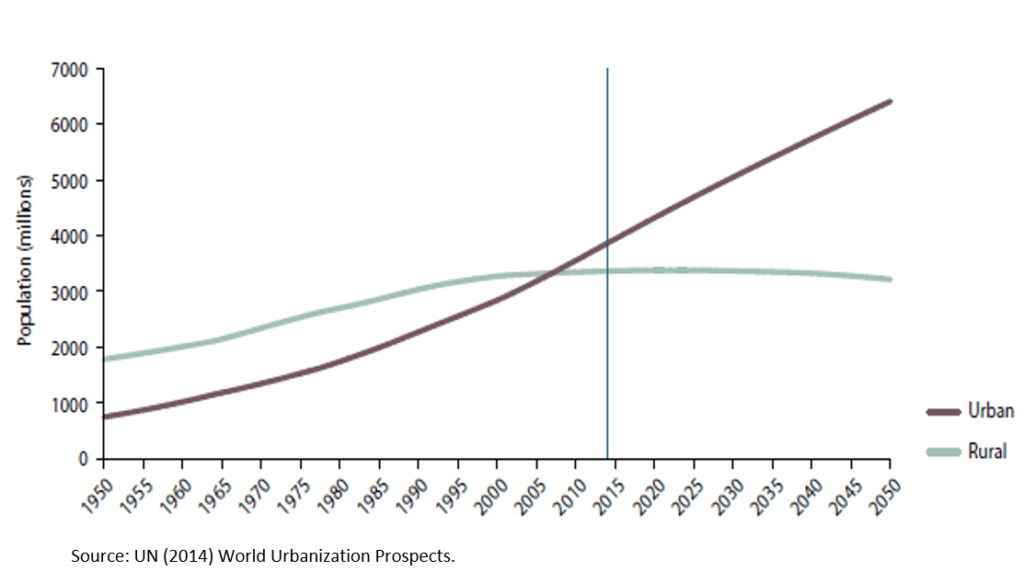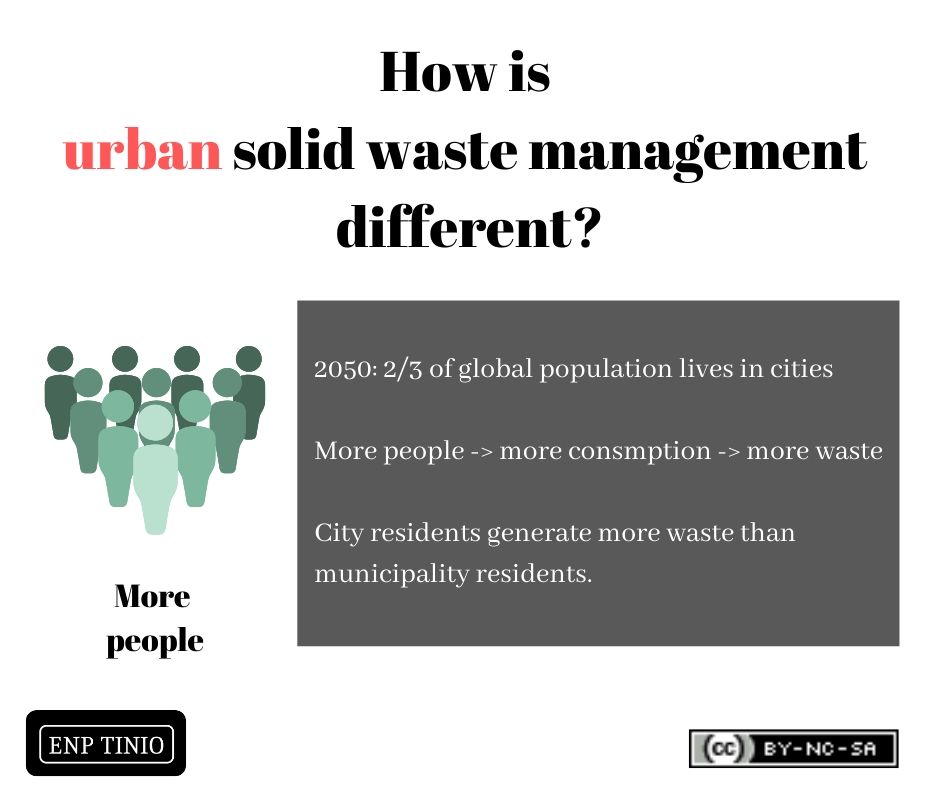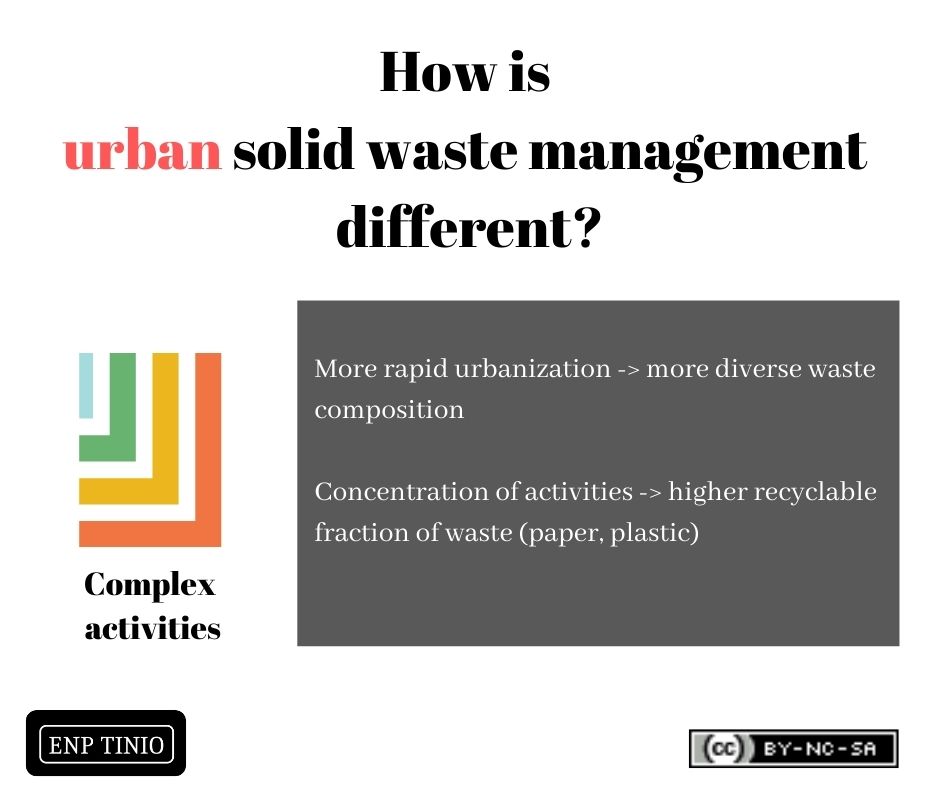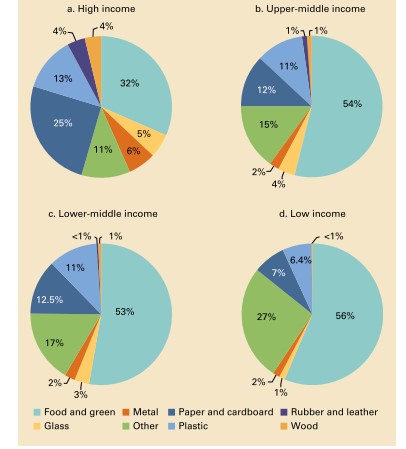Do you see waste management as a problem in the Philippines?
Poor solid waste management is a problem for the whole Philippines.
Even with a landmark Philippine law for solid waste management, our solid waste management system is still unsystematic.
Most often, poor solid waste management is simplified into lack of community discipline.
Often argued is that personal behavior is the cause for litter.

However, a geographic perspective can improve our understanding of why poor solid waste management persists (see this example of Quezon City solid waste management)
I argue that considering the attributes of urban and rural areas are essential in enhancing waste management interventions.
Interested in solid waste management planning?
I propose three reasons why urban solid waste management is different from general solid waste management.

More people are living in urban areas
Global urban population exceeded global rural population in 2007.
A 2014 UN projection states that by 2050, 2/3 of the global population will live in urban areas .

The Asian Development Bank projected in 2014 that 76% of the Philippine population will be urban in 2030.
With more people in urban areas, higher volumes of waste are expected. The World Bank estimates global annual waste generation to reach 3.4B tonnes by 2050.
Population growth and urbanization are two correlated phenomena.
Related Articles:
As populations increase, areas tend to urbanize.
As areas urbanize, populations tend to be attracted to settle.
And as an area urbanizes and grows in population, higher volumes of waste are expected.
For example, Metro Manila cities and highly-urbanized cities, which are more urbanized, have higher rates of waste generation per capita than municipalities, which are often part urban and part rural.

The diversity of peoples living in urban areas also mean multiple cultural and social behaviors in managing waste.
An example is the burning of waste.
Older population groups in rural areas are accustomed to burning leaves and branches of trees.
As commercial and industrial activities increase, plastic and paper content in waste also tend to increase (e.g., Guzman et al. 2010).

If population groups continue with the practice of burning waste, with plastic and paper content, harmful substances are released to the air.
Read: 11 Statistics about Philippine Solid Waste Management
Urban solid waste management goes beyond urban population numbers.
Cultural and social considerations of urban demographics influence the solid waste management system as well as the number of waste generators.
Urban areas have different roles than rural areas.
Economic activities in urban areas are more complex.

Rural areas are most often hosts of low-order activities, e.g., agriculture and fishing.
Urban areas are frequently a combination of low-order and high-order activities, e.g., manufacturing, services, decision-making.
With low-order activities, rural waste is expected to be mostly compostable.
As activities become higher-order, recyclable waste is generated.
Plastic are generated waste from manufacturing industries. Paper waste come from the services, institutional and education sector.
Waste composition in urban areas is expected to be more complex as these urban areas become more urbanized and higher in income.

Rural areas tend to become urban because of population and building concentration.
The concentration is correlated with specialization of activities, often marked with the conversion from low-order economic activities to high-order activities.
Economic activities become especially complex when rapid urbanization occurs.
The inability of developing countries to cope with rapid urbanization are evidenced by urban deterioration, such as lack of housing, mismanaged traffic conditions, and improper solid waste management.
Urban areas have issues in space availability.

Urban areas increase in population and building density because of high-order economic activities.
Urban land is also prioritized for profitable activities like business districts.
Increase your urban planning knowledge by following these sites!
Because of high demand for limited supply of land, land prices become higher and only affordable for uses with obvious and quick return of investment.
Without proper urban planning, space becomes scarce for non-profitable activities like solid waste management.
As waste management becomes more difficult, citizens are less likely to participate.
A consequence of non-prioritization of solid waste management is the difficulty of waste management for urban households. Pick-up points for waste collection are farther from households.
Composting is also hindered because of lack of space and presence of impervious surfaces.
As waste management becomes more difficult, citizens are less likely to participate.

Neigborhood streets in high-density urban areas are often too narrow for collection trucks.
With inconsistent waste collection, residents opt for convenient alternatives like burning waste and curbside dumping grounds.
Cities of the Philippines and Waste Management Series:
- Waste Generation of Philippine Cities
- Waste Management Information on Antipolo City, Rizal
- Waste Management Information on Dasmarinas City, Cavite
- Waste Management Information on San Pablo City, Laguna
- Waste Management Information on Cavite City, Cavite
- FREE! Tool for Gathering Waste Management Data
The situation is a rationale for integrating informal waste management strategies like scavengers and door-to-door waste collectors into the urban waste management system.
Stronger rejection of waste facilities is also expected in urban areas. Land is prioritized for uses that are financially profitable and waste management seldom generates income.
With high-density housing in urban areas, waste facilities are more likely to be rejected due fear of harmful effects on public health and aesthetics.
Waste facilities are often located far from population and economic centers not because of public health concerns but because of economic non-value.
Conclusion
Urban solid waste management is an urgent need for the world. Tackling a complex issue like solid waste management requires focus on high-impact considerations.
Understanding the geographical attributes of urban areas allows for better interventions in solid waste management.
Read: A Geographical Overview of Solid Waste Disposal in Quezon City
